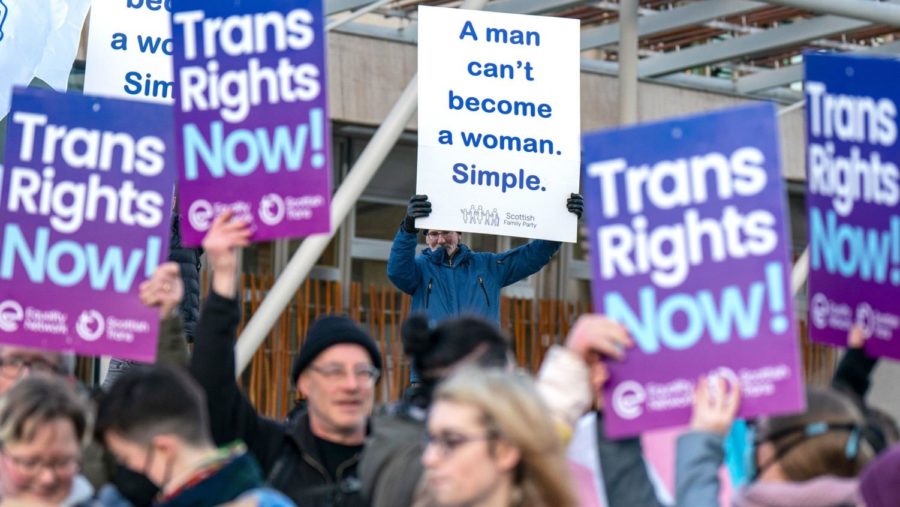UK blocks Scotland’s gender ID bill
Protests taking place outside the Scottish Parliament regarding the Gender Recognition Reform Bill
According to the official Scottish government website, the current law regarding gender ID states that “The standard track is most commonly used and this requires applicants to be aged 18 or over, to provide evidence of a diagnosis of gender dysphoria and that they have lived in their acquired gender for at least two years, and to make a statutory declaration that they intend to live in their acquired gender for the rest of their life.”
On Jan. 16, the UK government led by Prime Minister Rishi Sunak blocked Scotland’s gender identity bill. What does this mean for transgender Scottish citizens?
According to NPR, Scottish lawmakers attempted to make the law more accessible by making it so that transgender citizens would not have to go through a medical examination in order to legally identify as a gender of their choice.
The underlying issue that the UK is actively arguing against is that “a person could essentially be one gender legally on one side of the Scottish-English border and then another gender legally a mile away across that border.” [NPR]
Scottish Secretary Alister Jack stated to Scottish Parliament that “The Bill would have a significant impact on, amongst other things, Great Britain-wide equalities matters in Scotland, England, and Wales. I have concluded, therefore, that blocking it is the necessary and correct course of action.”
It may seem ridiculous that Scotland and the overhanging UK government need to agree on this in the first place, but similar to Wales and Northern Ireland, Scotland has its own semi-autonomous government with larger powers over areas such as health care.
Stated simply, according to NPR guest journalist Willem Marx, “It was [former Prime Minister of the UK Tony Blair’s] government that instituted reforms that created a Scottish Parliament. It would allow it to control particular areas of life in Scotland, like health care and education, but with the caveat that if the Parliament in Scotland tried to pass a law that would impact existing U.K.-wide laws, the government down in London could essentially block them.”
This law has not only been spoken on by trans rights activists like the LGBTQ+ campaign group Stonewall, who said that “when Ireland did it, nobody else was affected, except trans people who for the first time were able to have their gender recognized in a straightforward and empowering way by the state.” [CNN]
Additionally, Helen Belcher, the chair of TransActual, said in a statement that “There is no justification for this action by Scottish Secretary [Alister] Jack. He will lose any case brought by the Scottish government because the Equality Act is 100% independent of the Gender Recognition Act – and nothing in the Scottish Bill changes that.” [CNN]
Lastly, a sticking point among Scottish citizens fighting to get the law approved like First Minister of Scotland Nicola Sturgeon is that “trans people are being used as a political weapon.” [BBC]
On the other side of the bill, however, Harry Potter author J.K. Rowling said, “the law could have a detrimental effect on the rights of women and girls.” [CNN]
Finally, Jack stated that “We will find out whether the court of opinion that I’ve been hearing is right or wrong when we go to the legal courts.”
To find out more you can go to tracktranslegislation.com to track various bills regarding transgender rights.






